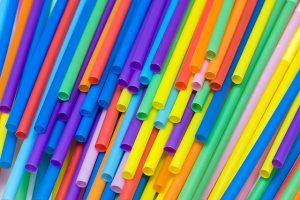Plastic, an ingenious and versatile solution to the demands of mass production, has become an environmental challenge of mass proportions. While swelling landfills are relatively easy to ignore, we've become increasingly aware of the threat disposable plastic poses to rivers, lake and oceans—a major source of human food supply, as well as a vital part of Earth's ecosystem.
But if humans are resourceful enough to create plastics, perhaps we're creative enough to solve the problems of plastic pollution, too. These five articles discuss the growing trend of reusable and biodegradable alternatives. You can read these articles using CPL's Online Resources, but I've noted if an article is available freely on the web.
"Proposed Bans on Plastic Straws Run into Resistance in Hawaii and Dozens of U.S. Cities" by Elaine S. Povich
Honolulu Star, July 1, 2018
Advocates for business and people with disabilities have questioned whether a ban on plastic products like straws is the right solution, but experts suggest the consideration of bans (such as the advisory question on Chicago's most recent ballot) is an encouraging sign of rising consumer awareness of the problem. Meanwhile, several top businesses are making plans to phase out plastics in favor of biodegradable products while still accommodating the needs of their customers. "Starbucks Is Ditching Plastic Straws by 2020" details plans by the coffee chain and others.
"Paper or Plastic? Chicago Bag Tax Is Encouraging Shoppers to Say 'Neither'" by Lauren Zumbach
Chicago Tribune, August 7, 2017 (also available on the Chicago Tribune website)
Six months after a local tax on plastic bags took effect, plastic bag use declined significantly. The measure raised less revenue than expected, but it successfully prompted more consumers to use reusable bags for shopping. (The impact still held up a year later. As well, many businesses plan to phase out plastic bags, as the Associated Press reports in "Requiem for the Plastic Bag" (August 24, 2018).)
"Teaching Students Not to Waste by Giving Them Water Bottles" by James Barron
New York Times, September 24, 2018 (also available on the New York Times website)
In an effort to cut down on disposable plastic pollution, students were given reusable bottles through a business/government partnership.
"It Took 5 Years, Now the Ocean Cleanup System Is Heading to the Great Pacific Garbage Patch" by Elizabeth Weise
USA Today, September 9, 2018 (also available on the USA Today website)
Perhaps the most distressing symptom of the plastic pollution challenge are the giant islands of trash gathering in the world's oceans. A young college dropout helped launch an ambitious effort at cleanup. Can it make a dent?
"New Eco-Friendly Microbeads Could Save Oceans, Rather Than Destroy Them" by Kate Baggaley
Popular Science, May 1, 2018
Plastic microbeads are one of many problems the beauty industry is dealing with, but researchers are exploring biodegradable alternatives.



Add a comment to: 5 Articles: Rethinking Plastic